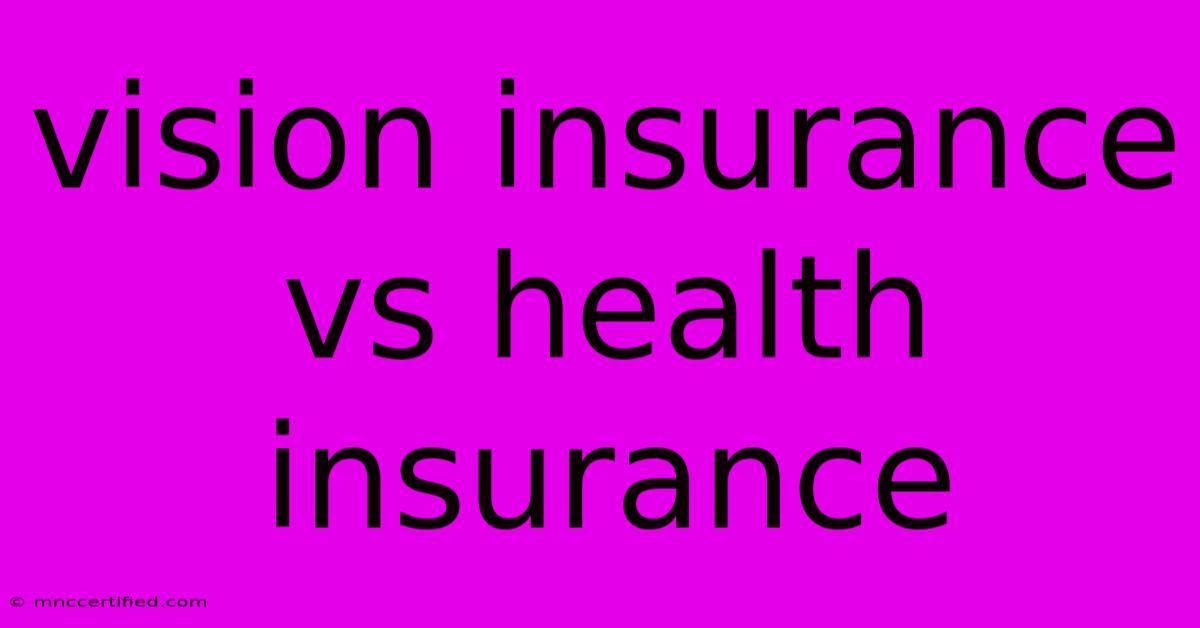Vision Insurance Vs Health Insurance

Table of Contents
Vision Insurance vs. Health Insurance: What's the Difference?
Many people think of vision insurance and health insurance as the same thing, but they are actually distinct. Both cover healthcare costs, but they focus on different aspects. Understanding the differences between vision insurance and health insurance can help you make informed decisions about your healthcare coverage and save money.
What Does Vision Insurance Cover?
Vision insurance specifically covers eye care, including:
- Eye Exams: Routine eye exams to check for refractive errors, eye diseases, and other conditions.
- Glasses and Contact Lenses: Coverage for the purchase of glasses and contact lenses, often with annual limits on the amount reimbursed.
- Laser Eye Surgery: Some vision plans may offer partial coverage for laser eye surgery procedures like LASIK.
- Eye Injuries and Diseases: Coverage for treatment of eye injuries and diseases, such as cataracts, glaucoma, and macular degeneration.
What Does Health Insurance Cover?
Health insurance covers a broader range of healthcare services, including:
- Doctor Visits: Coverage for visits to primary care physicians, specialists, and other healthcare providers.
- Hospital Stays: Coverage for inpatient hospital stays, including room and board, surgery, and other medical services.
- Prescription Drugs: Coverage for prescription medications, often with a co-pay or deductible.
- Mental Health Services: Coverage for mental health services, including therapy, counseling, and medication.
- Emergency Care: Coverage for emergency room visits and ambulance services.
When Do You Need Vision Insurance?
Vision insurance is essential for people who:
- Wear glasses or contact lenses: Vision insurance can significantly reduce the cost of purchasing and replacing eyewear.
- Have a family history of eye diseases: If you have a family history of eye diseases, such as glaucoma or macular degeneration, vision insurance can help cover the costs of screenings and treatments.
- Want to access affordable eye care: Vision insurance can make regular eye exams and treatments more accessible.
When Do You Need Health Insurance?
Health insurance is crucial for people who:
- Need to access healthcare services: Health insurance provides financial protection for unexpected medical expenses, such as hospital stays or major surgery.
- Have pre-existing medical conditions: Health insurance can help cover the costs of managing chronic conditions, such as diabetes or heart disease.
- Want to access affordable prescription drugs: Health insurance can help lower the cost of prescription medications, making them more accessible.
Can You Have Both Vision Insurance and Health Insurance?
Yes, you can have both vision insurance and health insurance. In fact, it's often recommended to have both. Vision insurance focuses on eye care, while health insurance covers a broader range of medical needs.
What Are the Benefits of Having Both?
Having both vision insurance and health insurance offers several advantages:
- Comprehensive Coverage: You have comprehensive coverage for both eye care and general medical needs.
- Cost Savings: You can save money on both routine eye care and major medical expenses.
- Peace of Mind: Knowing you have insurance for both eye care and general health gives you peace of mind.
Choosing the Right Coverage
When choosing vision and health insurance, consider your individual needs and budget. Compare plans from different insurers to find the most affordable and comprehensive coverage. Consider factors such as:
- Coverage limits and deductibles: Be aware of the limits on coverage and the deductibles you'll have to pay.
- Network of providers: Make sure your preferred eye doctors and healthcare providers are included in the network.
- Prescription drug coverage: If you need prescription medications, consider the coverage offered by different plans.
Conclusion
Vision insurance and health insurance are essential for maintaining good health and well-being. By understanding the differences and benefits of each type of coverage, you can make informed decisions about your healthcare and protect yourself financially from unexpected medical expenses. Remember to compare plans and choose the coverage that best suits your individual needs and budget.

Thank you for visiting our website wich cover about Vision Insurance Vs Health Insurance. We hope the information provided has been useful to you. Feel free to contact us if you have any questions or need further assistance. See you next time and dont miss to bookmark.
Featured Posts
-
Dogecoin Rally 78 Gain Tops Xrp Usdc
Nov 11, 2024
-
George Dickel Bottled In Bond Review
Nov 11, 2024
-
Jets Fall To Cardinals Rodgers Stays Silent
Nov 11, 2024
-
Insurance Check With Bank Name On It
Nov 11, 2024
-
Chelsea Vs Arsenal Free Stream And Tv Info 11 10 24
Nov 11, 2024